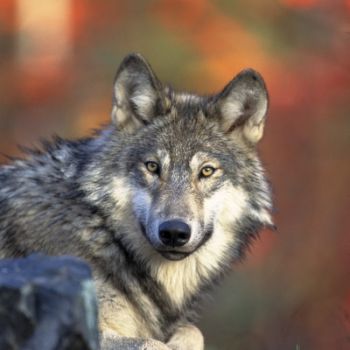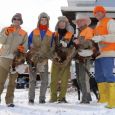The Gift of South Dakota
Subscriptions to South Dakota Magazine make great gifts!
Subscribe today — 1 year (6 issues) is just $29!
Hunting For a Sensible Policy
Oct 8, 2012
Environmental policy conflicts can sometimes be easy to solve when you are looking for a tradeoff between well-defined goals and interests. They can be almost impossible to resolve when impressionism trumps analysis.
Several years ago I spent some time in Yellowstone with a group of professors and students. Our task was to study three environmental issues. One was the conflict between snowmobilers and “quiet park” advocates. The second was the conflict between ranchers and wolves. The third involved the threat of brucellosis, a disease that might possibly be communicated between Yellowstone’s bison and ranch cattle. A week of watching wolves and buffalo, talking to ranchers and listening to lectures, hardly makes me an expert; however, I came away thinking that all three problems were manageable.
By restricting the snowmobiles entering the park to the quieter models, limiting the number of machines admitted and confining them to established roads, a reasonable balance had been struck between those who want to cross silent winter spaces on skis and those who want to roar through such spaces in a train of rockets.
The ranchers I talked to did not like wolves one little bit, but they were largely reconciled to the fact that wolves aren’t going away again. Wolves are everywhere now as a result of an extremely successful reintroduction policy. Ranchers want a little more freedom to kill wolves that are preying on their livestock and maybe they should get it. Apart from that, there is little to fight about.
The brucellosis problem is more difficult but it may be manageable. This disease is a great threat not only to ranchers but to the entire cattle industry in states where it appears. Ranchers fear that Yellowstone’s bison herds might infect their cattle and they want those herds to be better contained. In addition to buffalo, elk also carry the disease. That is a touchier issue as everyone likes elk. Some ranchers we talked to earn extra income guiding parties of hunters. There is evidence that artificial elk feeding grounds, intended to keep elk numbers up over winter, are a major cause of infection among those animals.
There is hope that Brucella abortus can eventually be eliminated from Yellowstone animals. In the meantime, slaughtering bison that leave the park and eliminating elk feed grounds may be both necessary and sufficient.
For a lesson in how not to approach such issues as these, consider the Chicago Tribune’s recent editorial: "The War on Wolves." The Trib has its fur up over the legal hunting of wolves. The editorial begins with a misanthropic musing on the misbehavior of the human species. It then proceeds to articulate an environmental version of original sin, “How could the feds tolerate the hunting of an ecologically important creature that, by the mid-1900s, was hunted almost to oblivion?”
Apparently the Trib thinks that we should not ask whether hunting limited numbers of wolves is a threat to the recovered wolf population. The editorial never raises that question. Instead we should consider the guilt we bear for our past sins. We shouldn’t hunt wolves now because we were bad to them in the past.
The Trib lumps ranchers who fear wolves preying on their herds with hunters who want a chance to put a wolf head over their dining room tables as a vast alliance bent on the extinction of all things lupine. This is noxious numbskullery. Most ranchers would indeed like to see wolves go away altogether. Hunters by contrast would like to see the population of wolves increase so that their chances of bagging one would go up. Hunters and conservationists are natural allies whenever they are willing to look each other in the eye. That, of course, is the problem.
The Tribune’s editors assure us that “We aren't anti-hunting.”
No. They are anti-hunter, as is clear from this gem:
The conflict pits people who would enjoy shooting wolves — think Sarah Palin, firing from an aircraft — against what a Montana wolf hunter interviewed on The Sportsman Channel called "a bunch of wingnut screwballs from wherever (telling) us how to manage wildlife.
I am not sure what the Chicago Tribune thinks about ranchers, but its editorial is dripping with loathing for hunters and trappers. It is altogether innocent of the simple question whether the hunting of wolves makes sense as ecological management. That might not be the best way to consider conservation policy.
I don’t hunt but I have no objections, moral or otherwise, to hunting. I am just plain scared of guns. As for wolves, I think they are about as cool as any animal that walks the earth. I spent a marvelous day at Yellowstone watching them through scopes. I chanced to see a pair of them digging for something only a few feet away from my car. I think that the reintroduction of wolves to Yellowstone and elsewhere was a great achievement. I hope that their populations flourish and increase.
If hunting wolves is a threat to wolf populations, then we should not allow it. If it is not such a threat, then we certainly should allow it. Adding hunters to those who want to see more wolves strengthens that constituency. If you want to find a reasonable solution to such conflicts, perhaps reason ought to be your guide. What you think of Sarah Palin might not be so helpful.
Dr. Ken Blanchard is a professor of Political Science at Northern State University and writes for the Aberdeen American News and the blog South Dakota Politics.











Comments
Years ago Isle Royale in MI was a prime example. The wolves they located to the island eventually proliferated and decimated the entire moose herd.
Idaho has seen it's moose and elk populations show a major decline from their wolf packs.
Doesn't nature have a reason for what she does? Would the extreme environmentalists call for the re-introduction of dinosaurs to the plains of SD if it were possible today?
I think it an act of profound appreciation for nature to bring the wolf back. Whatever problems it creates looks manageable. I don't know about the island you mention, but surely we should be judicious in where we choose to relocate them.